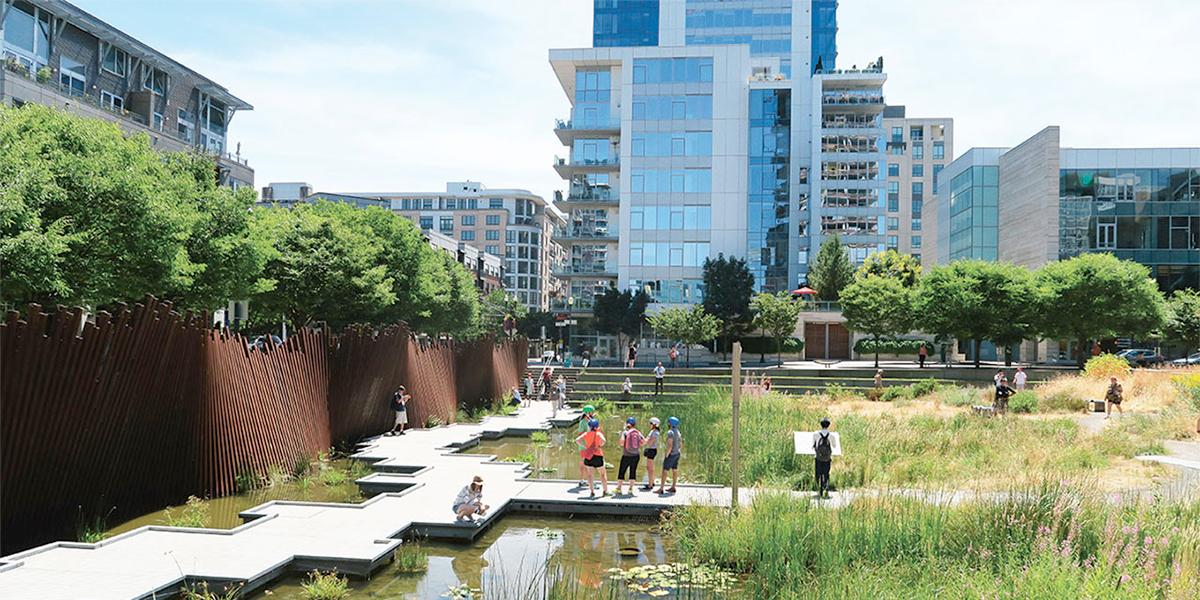Last year, the state of Washington began exploring if, and how, public-private partnerships could help to improve water quality and quality of life for their communities. These partnerships help communities make the most of limited resources by partnering with the private sector to implement infrastructure projects that create economic growth and other community benefits.
In order to determine the feasibility and focus of a pilot program, Washington State Department of Commerce commissioned a Community Based Public-Private Partnership (CBP3) feasibility assessment. Environmental Incentives assisted the state with the feasibility assessment and lead a team with partners Geosyntec Consultants, Corvias and FutureWise.
What are Community Based Public-Private Partnerships
A CBP3 enables a local government agency and private entity partner to work together to manage stormwater infrastructure. Local governments fund the project and the private partner delivers the project, with some portion of the project delivery risk transferred to the private partner. A CBP3 can be financed using a range, and likely a combination, of different public and private funding sources from municipal bonds and loans to grants and private equity. A key aspect of a CBP3 is that multiple project phases, which are traditionally contracted separately with unique contract terms, are bundled into a single contract and create the opportunity to improve project outcomes.
The CBP3 model develops a strong, long-term partnership between local government and the private partner, leading to many potential benefits including:
- Expedited project delivery
- Investment in underserved communities
- Increased scale of implementation
- Shared risk and aligned incentives
- Expanded expertise & innovation
- Increased opportunities for implementation
- Cost savings
- Access to private project financing
CBP3s are achieving success across the country
In Maryland, Prince George’s County is using a CBP3 to improve water quality and quality of life for their community. The Clean Water Partnership is a partnership between Prince George’s County and a private party (Corvias) and uses a Design-Build-Operate-Maintain (DBOM) contract structure with performance-based payment terms. Community benefits include using certified small, minority, and women-owned businesses; community outreach, including educating students on sustainable stormwater management; and assisting tax-exempt, faith-based, or other nonprofit organizations with stormwater compliance. Phase 1 of the Clean Water Partnership resulted in 2,000 acres of retrofit credits through the installation of 266 Best Management Practices (BMPs) at 94 project sites, and in half the time and for half the price compared to traditional procurement.
Washington CBP3 Feasibility Assessment Results
The feasibility assessment is the first step in developing a CBP3 pilot program for Washington. It identifies the types of local governments that are better suited than others to implement and benefit from implementing a CBP3, and provides recommendations to improve conditions that facilitate CBP3 projects. In addition, the assessment illustrates specific contracting arrangements, performance-based payment strategies, and alternative compliance and financing mechanisms that can accelerate achievement of stormwater and community goals.
Through the assessment, our team developed criteria to determine the likelihood that local stormwater departments could leverage large-scale CBP3s. These included: project scale, legal authority and risk appetite, sustainable revenue, measurement and verification, and community benefits. Key findings related to these criteria are included in the report, such as:
Project Scale Matters
A CBP3 is best suited for large projects. Meaningful scale is necessary for private partners to take on project risk and have the flexibility to create innovative solutions that maximize environmental and community benefits.
Despite Perceptions, CBP3s are Feasible in Washington
Although all local government representatives interviewed perceived legal barriers related to procurement and contracting CBP3s, they are feasible under current procurement laws.
Performance Contracts are Rare Yet More Broadly Applicable
Few local government representatives interviewed were aware of or had considered using performance contracts for developing and maintaining stormwater infrastructure, yet they were found to be broadly applicable and beneficial for local governments.
To learn more, download the Washington Stormwater CBP3 Feasibility Assessment for key findings and recommendations.
Next Step in Developing Pilot Projects
Local governments need expertise to navigate the range of legal, financial, and performance management considerations associated with developing CBP3s and performance contracts. To address this need, the Washington Department of Commerce is developing a Stormwater CBP3 Guidebook to provide direction and resources to local governments. Environmental Incentives has been selected to assist the state with development of the Guidebook with partners Geosyntec Consultants and Corvias.
Talk to Our Experts
Katie Riley is a Senior Associate and leads Environmental Incentives’ Habitat Team. She has over 11 years of experience with program design and adaptive management.
Chad Praul is a founding Partner for Environmental Incentives and leads the Domestic Portfolio. His career is focused on performance-driven approaches to conservation and wise use of financial resources.



